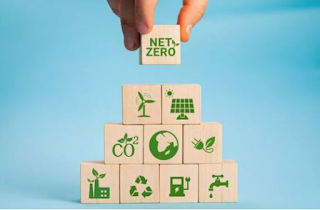Introduction:
Welcome to our blog post dedicated to exploring the road to zero carbon and the
strategies necessary for building a sustainable future. In this article, we
will delve into the concept of zero carbon, discuss the challenges we face, and
highlight the strategies that can pave the way to a greener and more
sustainable world.
1.
Understanding Zero Carbon: Zero carbon refers to the
state in which greenhouse gas emissions, particularly carbon dioxide, are
minimized or balanced by natural carbon sinks or offset through measures like
carbon capture and storage. It is a crucial concept for combating climate
change and ensuring a sustainable future for generations to come.
2.
Current Challenges and the Need for Strategies: Our
planet faces significant environmental challenges due to carbon emissions,
including climate change and air pollution. Urgent action is required to
mitigate these effects and transition to sustainable energy sources. This is
where the strategies for achieving zero carbon play a pivotal role.
3.
Policy and Legislative Frameworks: Governments and
international organizations play a crucial role in setting policies and
frameworks that drive the transition to a zero-carbon future. We will explore
landmark agreements such as the Paris Agreement and delve into national targets
for carbon reduction, showcasing how these policies can incentivize sustainable
practices.
4.
Renewable Energy Transition: Transitioning from fossil
fuels to renewable energy sources is a key strategy for achieving zero carbon.
We will discuss various renewable energy technologies such as solar, wind,
hydro, and geothermal. By highlighting their benefits and potential for
widespread adoption, we aim to inspire a shift towards clean and sustainable
energy.
5.
Energy Efficiency and Conservation: Improving energy
efficiency and implementing conservation measures are vital for reducing carbon
emissions. We will examine strategies for enhancing energy efficiency in
buildings, transportation, and industrial processes. From smart technology to
energy management systems and behavioral changes, every step counts in
achieving significant energy savings.
6.
Decarbonizing Transportation: The transportation sector
is a significant contributor to carbon emissions. We will explore the
challenges and solutions for decarbonizing transportation. Electric vehicles,
charging infrastructure, and promoting sustainable transportation options like
public transit and active mobility will be discussed, highlighting their potential
to reshape the way we move.
7.
Sustainable Urban Planning and Infrastructure: Creating
low-carbon cities through sustainable urban planning is essential. We will
discuss strategies such as compact urban design, mixed-use development, green
spaces, and efficient public transportation systems. The role of sustainable
infrastructure, including energy-efficient buildings and smart grid systems,
will also be explored.
8.
Circular Economy and Waste Management: The concept of a
circular economy, which minimizes waste and promotes sustainable consumption,
is integral to achieving zero carbon. We will delve into strategies for
reducing waste generation, increasing recycling rates, and implementing
sustainable waste management practices. By adopting circular economy principles,
we can move closer to a zero-waste future.
9.
Community Engagement and Awareness: Active community
engagement and awareness are vital in driving the transition to a zero-carbon
society. We will discuss the role of education, public outreach, and behavior
change campaigns in promoting sustainable practices. Encouraging readers to
take action in their daily lives, support clean energy initiatives, and
advocate for policy changes will be a key focus.
Conclusion:
In conclusion, the road to zero carbon requires a collective effort and a range
of strategies. By understanding the concept, embracing renewable energy,
prioritizing energy efficiency, transforming transportation, promoting
sustainable urban planning, implementing circular economy principles, and engaging
communities, we can build a sustainable future. Let's take action and pave the
way to a greener, cleaner, and more sustainable world.

